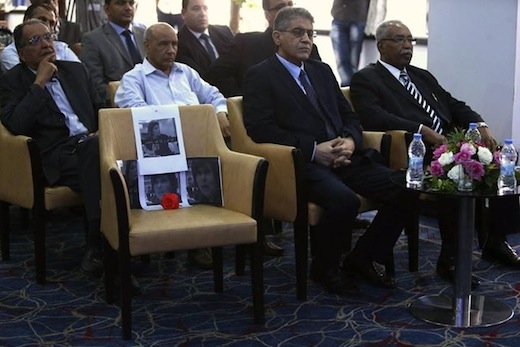By Libya Herald staff.
Tripoli, 27 June 2014:
Yesterday marked the United Nations’ International Day in Support of Victims of Torture.
Lawyers for Justice . . .[restrict]in Libya (LFJL), the REDRESS Trust and the DIGNITY Danish Institute Against Torture observed the day by calling on Libyans to ensure an end torture in the country and expressing their “condemnation and concern over the continuing acts of torture and other ill-treatment in Libya”.
In a joint press release, LFJL and the other two organisations denounced torture, calling it “one of the most grave human rights violations,” and that it destroyed a person’s “inherent dignity”.
Speaking of a nation’s obligation to protect its citizens from torture in any situation, the organisations’ called on the Libyan government to take steps to prevent all forms of torture and to ensure that the criminal justice system investigated and prosecuted perpetrators of torture.
They also called for the authorities to provide reparation for victims of torture.
The three organisation pointed out that torture was an institutionalised feature of Qaddafi’s security apparatus and that since the revolution, the Libyan authorities had said torture would be eradicated. Yet UNSMIL had recorded 27 cases of death of detainees in custody as a result of torture between late 2011 and Oct. 2013.
They also noted that the UNHCR had adopted a resolution in March 2014 calling on Libya to “intensity efforts to prevent acts of torture, to investigate all allegations of torture and other ill-treatment in detention facilities, and to bring to justice those responsible”.
The press release stated that although some efforts had been made to put in place legislation complying with the provisions in the ratified UN Convention against Torture and Other Cruel, Inhumane or Degrading Treatment or Punishment (UNCAT), such legislation “remains weak”.
Article 2 of the 2013 Law Criminalising Torture, Enforced Disappearances and Discrimination, they stressed, fell short of full inclusion of all the provisions of UNCAT.
Libya must enact legislation that adheres fully to UNCAT, the three demanded, adding that it and to ensure that the law was then enforced.
The three also called for more training for people, such as prison guards, personnel who deal with detainees and for the government to ensure that detention facilities are safe and properly regulated.
The Libya Herald reported on widespread abuse in Libya’s migrant detention centres recently.
The Ministry of Justice statistics released in March disclosed that there were 6,200 detainees held in prisons under the Judicial Police, only ten percent of whom had been convicted of a crime. Many are supposed Qaddafi loyalists were detained during conflict.
In spite of a deadline requiring authorities to charge or release all detainees “affiliated to the former regime” by 2 April, hundreds have yet to be screened by the prosecution, the three organisation said in their statement.
It called on the Libyan authorities “promptly to charge or release such detainees in compliance with the General National Council (GNC) Law on Transitional Justice passed on 22 September 2013.”
The press release further expressed the authorities’ obligation to bring detention facilities currently run by armed militias under government control.
With few legal and effective mechanisms for making reparations to victims of torture and the overall chaos in the country, not much has been done to seek redress for for victims, it said.
It noted that despite efforts by the National Council for Civil Liberties and Human Rights (NCCLHR) to record human rights abuses and provide opportunities for redress, the fact that only 61 cases of torture were reported to NCCLHR in 2013 suggested that many victims had failed to report abuse because they were “discouraged to seek redress sure to the poor security situation”.
The organisations urged the government to “ensure adequate resources to the NCCLHR and other governmental bodies so that all reports are promptly and adequately investigated”.
The statement also mentioned the danger that lawyers, activists, judges, prosecutors and witnesses have faced when dealing with the subject of torture. It mentioned the assassination of former Attorney General Abdulaziz Hassadi on 8 February and the assassinations of six other individuals involved in the criminal justice system.
“Attacks or threats against those who work in the law weaken the justice system and prohibit victims of torture from accessing adequate mechanisms for redress,” stated the organisations, calling on the state to ensure that those who work within the criminal justice system do their work, prosecuting perpetrators of torture, without fear of reprisals.
The press release ended by calling on the newly elected House of Reprsantatives to:
- Ensure legislation complies with international standards;
- Ratify the Optional Protocol of the United Nations Convention Against Torture and Other Cruel, Inhuman or Degrading Treatment or Punishment;
- Bring militia-run detention facilities under the control of the Ministry of Justice as a first step to ensure that all facilities can be inspected and accessed;
- Include effective vetting mechanisms of all detention facilities to ensure that any administrators or guards reasonably suspected of committing human rights abuses are suspended from their duties;
- Guarantee regular and unannounced visits to detention facilities from public institutions and civil society;
- Provide adequate training for officials on the prohibition of torture and the treatment of prisoners;
- Ensure that statements and other evidence obtained through torture or other ill-treatment are not admissible in any legal proceedings except in relation to proceedings against a person accused of torture or other ill-treatment;
- Establish an adequate register for all detention facilities that would note the names of the detained, arrival date and charges;
- Promptly charge or release all detainees without charge;
- Establish governmental programmes for compensation and rehabilitation for torture victims;
- Ensure the protection of the legal profession from threats and harassments to allow the legal profession to investigate and prosecute cases;
- Guarantee the right to a fair trial, including the right to be informed at the time of arrest of the reasons for the arrest, the right to be granted access to a lawyer, to be promptly charged and informed of the charges and to be promptly brought before a court;
- Ensure all cases of torture are promptly and adequately investigated.
[/restrict]








